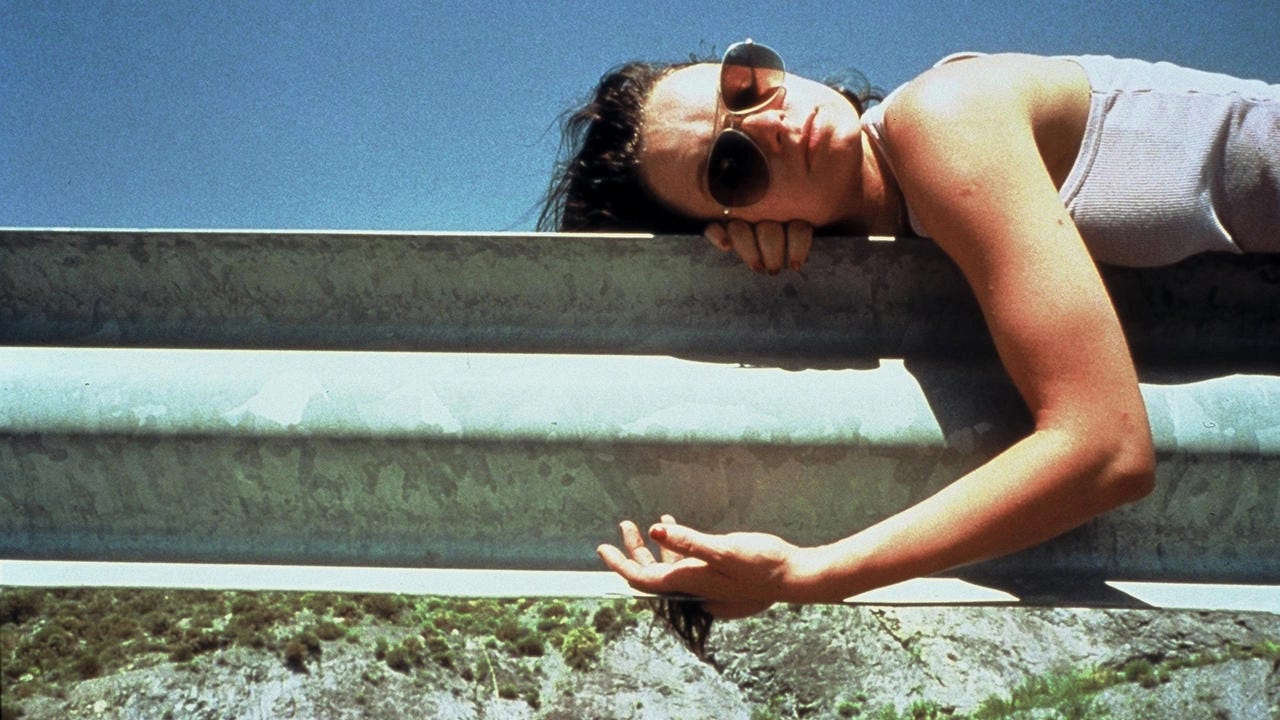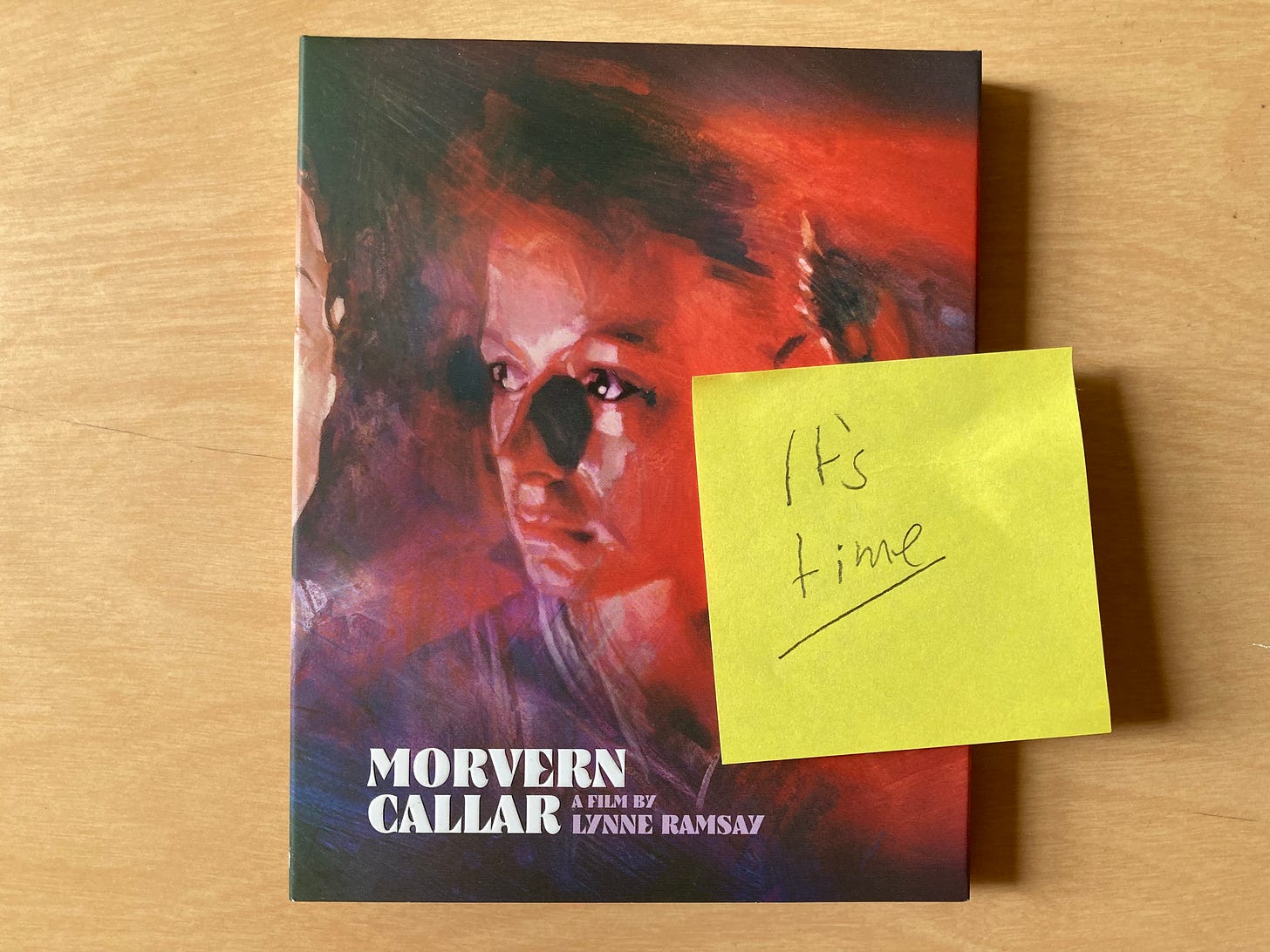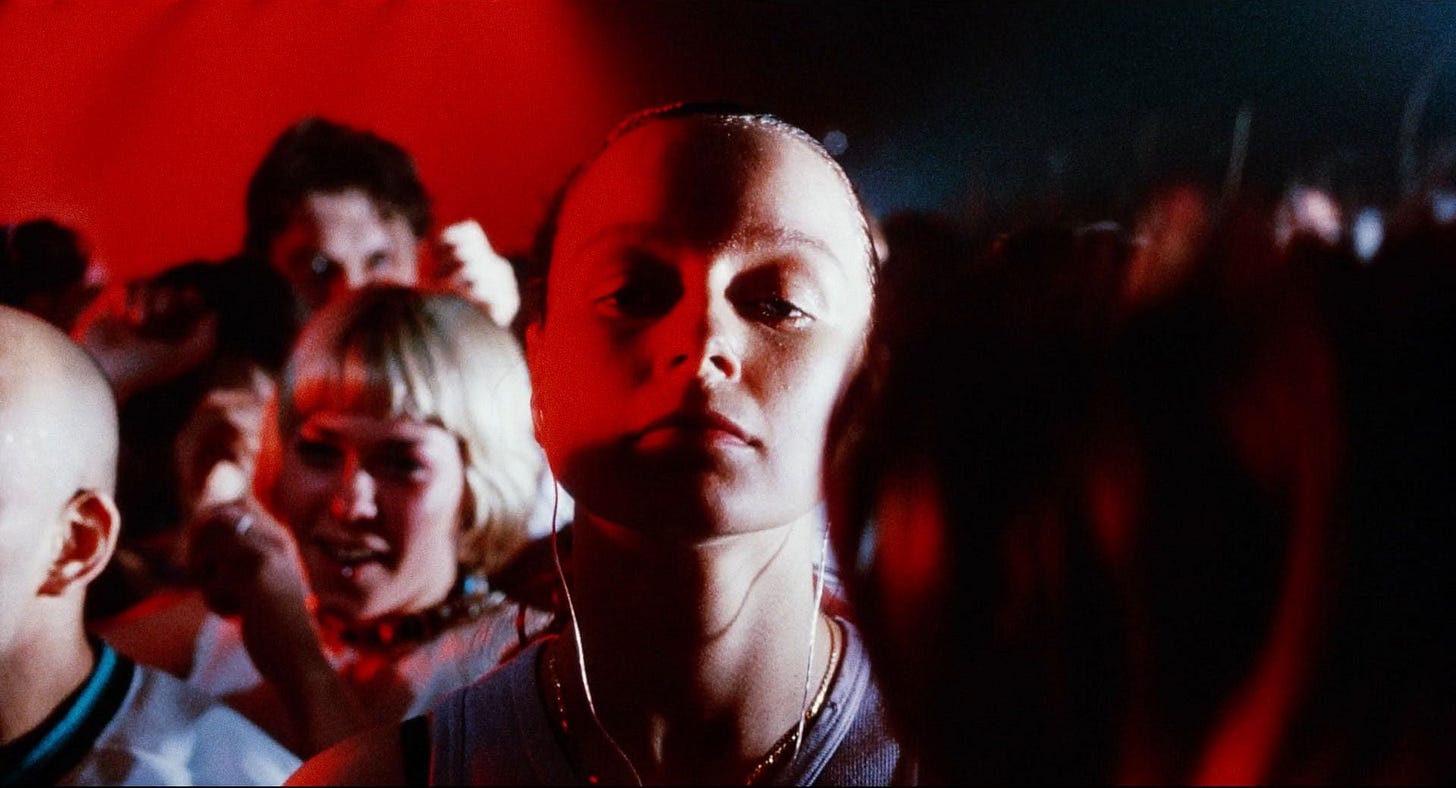WE NEED TO TALK ABOUT MORVERN CALLAR
How Emily’s two decade grudge against Lynne Ramsay’s breakout film ended
Lynne Ramsay’s 2002 film and Emily Schultz share a lot of qualities. Both are dreamlike, fiercely subjective, moody, kinda Scottish, and love pulsing krautrock. While Morvern Callar is considered one of the great films of the early millennium, Emily has hated it ever since seeing it in theater. It’s not that she isn’t a fan of Ramsay’s films in general. You Were Never Really Here is one of her favorites. What disturbed Emily about Morvern Callar was the film’s conceit after the titular character, played by Samantha Morton, finds her author boyfriend dead.
This changed earlier this year when, through exposure therapy, I increasingly brought Morvern Callar into Emily’s life, leading up to the moment this week when I left the film on her desk with a sticky note saying, “It’s time.” — Brian J Davis
BRIAN J DAVIS: Emily Schultz, in your own words, tell me how this movie hurt you.
EMILY SCHULTZ: I just remember almost immediately having a very visceral reaction to it. While the friend I went to see it with really liked it and didn’t understand my horror.
BJD: Because he brought a woman to a movie about a woman directed by a woman. That should have been an easy win.
ES: In theory, he had chosen well. But at the time, I was struggling to write my first novel, and I felt like it was killing me. Which, I think every first novelist feels like they’re going to be killed by their own novel and here we have Morvern’s boyfriend lying on the floor and he’s dead, and then she takes his novel!
BJD: I missed out on Morvern Callar at the time. And anytime I brought it up after, you had a ban against me even seeing it!
ES: I didn’t go that far.
BJD: You did! You’d be on tour and we’d be on the phone and I would say, You know, maybe I’ll finally watch Morvern Callar tonight and you’d be like No, you can’t. After this ban was lifted last year I watched—and loved—this film. I immediately read it this way: her boyfriend did this horrible thing. He killed himself in a way to inflict pain on her. Let her discover his body, and his final request is “take care of my literary legacy, babe.” When Morvern deletes his name and types hers on the novel’s title page, I saw such a profound act of subjectivity. It’s the first time she’s alive. I don’t know if I would have read that 20 years ago that exact way. I wouldn’t have had the life experience or knowledge that suicide can be many things other than tragic. I probably would have been geeking out about the soundtrack.
ES: I can’t say if I’d only seen this movie two years ago how I would have interpreted it. I just know that at the time I also had an argument with my close friend after the movie. So then that affected my viewing and reading of it as well.
BJD: Which happens when you go with friends and they say, what, you didn’t like that movie? And there’s an extra layer in this in that it has the ultimate hipster soundtrack of 2002. It was aimed at us.
ES: And even at the time when I watched it, I said there are things that this movie is doing that I really love… And I also hate this movie.
BJD: You actually tormented me over the years. Nancy and Lee is one of my favorite albums of all time and you’d let drop little things like, Oh and there’s this amazing scene in a sad supermarket set to “Some Velvet Morning.”
ES: Watching this again I don’t have the same sense of disgust.
BJD: You’re not that person anymore who is trying to finish a novel. You’ve written lots of novels. And it’s not that it’s easier, but the fear is maybe different?
ES: It’s like once you’ve climbed a mountain you realize you can go climb another mountain.
BJD: So he’s made her a goodbye mixtape of bangers, left his novel for her to send to publishers and his body is lying there, throughout Christmas. To me, this is the revenge of the manic pixie dream girl.
ES: Usually my frustration with a film comes from what it does well and what it winds up not doing well. I don’t get angry at movies that are three-stars. I get angry at movies that are doing something unique.
BJD: This is almost a silent movie there’s so little dialogue. This is actually good advice for any novel adaptation, which is to throw out most of the words and look for the images.
ES: I like how she’s taking some of his money from his pocket, but not all of it.
BJD: Well, that’s like when you steal money from Mom. And Morvern is young still, and she’s decided to completely deal with her boyfriend’s suicide on her own. And I thought you’d love that this really becomes about the relationship between her and her friend. And how she doesn’t want her friend’s life.
ES: I mean, that is part of youth. You don’t want your friend’s life, but you also have your friend’s life, and you don’t do anything to distance yourself from those people.
BJD: You’re trapped in a mirror, in a way, just as you need to learn how to be yourself.
ES: Again, my friend I saw this with, we devolved into a dumb fight about bodies and desecration and we were taking absurd sides.
BJD: Something like, So you’re telling me if I died, you would cut up my body and that would be okay in some cultures?
ES: Exactly! Very 20s.
BJD: It’s ironic that this is a beautiful portrait of friendship as well. The friend you have when you’re stuck in nowhere is a wonderful person to have.
ES: I mean, this is funny. Girls peeing outside after being up all night. That is the thing that you do with your best friend.
BJD: Whereas the opposite is tragic. If a woman is peeing in public alone, something has gone terribly wrong.
ES: Ah, 2002. The last year you could get away with saying that your boyfriend just got up and left, cut up the boyfriend’s body, then take his novel. And no one would know!
BJD: All set to the Velvet Underground’s “I’m Sticking With You.” Not to be that guy, but dead bodies don’t have arterial spray.
ES: You can see how I was a little rattled by this film!
BJD: Again, this goes back to the idea of the muse’s revenge. He said he wrote the novel for her. Why wouldn’t it be literally her book now? It’s an amazing button that the story presses.
ES: To be honest, as rattled as I was, over the years “Morvern Callar” became our code for when an author’s second book was horrible or tanked after a successful debut. What happened there? Must have been a Morvern Callar-situation with their first book.
BJD: Exactly. That’s what I find interesting about this film. It’s like the middle of a longer story. We start after her boyfriend’s suicide, but stop right before the inevitable literary scandal that would be the fallout of her actions.
ES: How are Morvern and her friend going on vacation to Spain for two weeks?
BJD: Scotland is a socialist country. They get time off! I absolutely love how not fucking talky this film is. After the last decade of streaming TV—which is 90 percent over-the-shoulder shots—this film is a cold drink of water.
ES: You can’t bury a body with a garden trowel! Sorry, my mother was a gardener.
BJD: So 2002: a paper acceptance letter from a publisher!
ES: I got paper acceptance letters from lit journals.
BJD: When was the last paper acceptance letter you received?
ES: Probably around 2002. Okay, so why can she forgive her friend for sleeping with her boyfriend?
BJD: Because her boyfriend didn’t mean anything to her after he left her in the worst possible way. Oh Jesus.
ES: What is it?
BJD: 2002 jeans. Boot cut and low rise?
ES: And visible thongs. It was dark times for petites.
BJD: It’s always good to get an alternative to Americans being the worst tourists on the planet because please meet the residents of the United Kingdom—close seconds for worst tourists on the planet!
ES: It’s amazing how inside Morvern’s head we are for this film. That makes her more like a novel character than anything else.
BJD: I love this scene. She’s at a Barcelona rave. Obnoxious gabber is playing and she’s listening to her own music on her headphones.
ES: That goes with how separate Morvern is from the world around her. She’s literally staying at the Apart hotel. Wait, why is she leaving the resort after her pickup?
BJD: She connected with someone, now she has to escape again. It’s like when you open your phone up and it’s on selfie mode and you go, oh, Jesus. I wasn’t ready for that exact insight.
ES: She just leaves her friend on the side of the road?
BJD: She left a note in her hand! When you’re young, stupid, and traveling, these are the decisions you make. Like, if you’re in London and an ex-girlfriend shows up from the Netherlands, you randomly take an overnight bus to Edinburgh with no place to stay just to avoid any confrontation. That totally is not any story that actually happened.
ES: Now she’s meeting with publishers who have flown to Spain to track down the future of literature. For the record this has never happened to any novelist anywhere ever.
BJD: Now, here’s a question. Has Morvern actually read the book she put her name on?
ES: No! Why do you think I hated her so much?
BJD: Another question. What would Morvern’s second book be?
ES: Short fiction collection? That would piss her publishers off! Now we end on her listening to his mix tape while at a rave.
BJD: She’s trying to reconnect with him.
ES: While also taking the one thing that he cared about and making it hers?
BJD: I think you just described a potent processing of grief in which you try to connect, but also move on.
Morvern Callar is available on Blu-ray from Fun City Editions.






